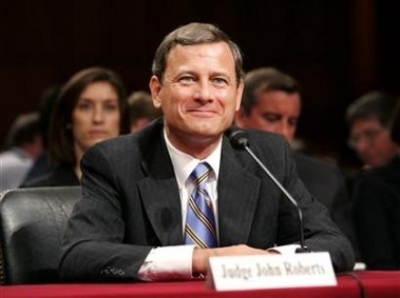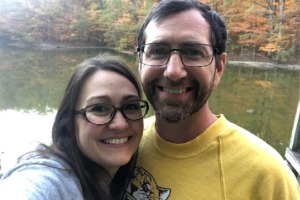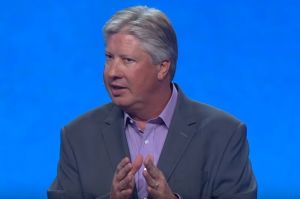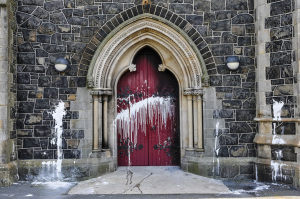Pastors, watch out. John Roberts is wrong and it matters.

Chief Justice John Roberts is wrong. In casting the deciding vote to uphold California’s onerous restrictions on religious worship services, the Chief Justice stated that he thought that California’s restrictions “appear consistent with the free exercise clause of the First Amendment.” He argues that similar or more severe restrictions apply to “comparable secular gatherings, including lectures, concerts, … spectator sports and theatrical performances.” This is a crucial, unconstitutional misjudgment. None of these other institutions are mentioned in the First Amendment. Religious exercise is, and, it’s mentioned first among our nation’s freedoms.
Roberts’ decision is contrary to over two centuries of legal precedent, which has recognized that churches and religious gatherings have special protections and the state must show “a compelling interest” in order to limit it. Such an interest is absent here given the safety measures that the petitioning church had put in place.
Not surprisingly, the Supreme Court’s conservative block, made up of Associate Justices Thomas, Alito, Kavanaugh, and Gorsuch, dissented vigorously. Justice Kavanaugh, writing for the minority, explained that the California executive order “discriminates against places of worship and in favor of comparable secular businesses. Such discrimination violates the First Amendment.”
Kavanaugh argued the state cannot “assume the worse when people go to worship but assume the best when people go to work or go about the rest of their daily lives in permitted social settings.”
The Supreme Court’s narrow decision certainly seems to contradict President Trump’s May 22nd Executive Order designating “houses of worship — churches, synagogues, and mosques — as essential services” and calling on governors to “do the right thing and allow these very important, essential places of faith to open right now. . . .”
Clearly this legal struggle is not over, and the very close nature of the Supreme Court’s liberal block victory in this case means it will continue to be strenuously debated. What the Chief Justice has catastrophically missed is the special and unique status that religious free exercise is granted in the Constitution.
Tens of thousands of Christians across the comparatively free parts of America had their first live, in-person, Christian corporate worship experience in many weeks this past Sunday. Many of them have since confessed that while they had missed the experience of corporate worship, they were stunned by the pure joy they felt from the very core of their beings as they shared their worship experience once again with their Christian brothers and sisters.
Perhaps that is one major reason why the New Testament admonishes Christians to not forsake “the assembling of ourselves together . . . but exhorting one another . . . (Heb. 10:25). Many Christians in America may have been tempted to take for granted their First Amendment guaranteed freedom to worship corporately, as well as individually. That temptation came to a sudden end when they were deprived that freedom of worship by various state governments’ edicts and severe restrictions.
As many of these Christians once again simultaneously experienced vertical relationships with their God (worship) and horizontal relationships (fellowship) with their Christian brothers and sisters, they have been vividly reminded that such an existential experience is integral to their shared Christian faith.
These deeply spiritual experiences of shared, communal worship are adding renewed urgency to the debate among Christian congregations about whether to comply with the restrictions being placed on churches by some state governments, but not others, in light of the COVID-19 pandemic.
The tensions generated by that question pre-date the U.S. Constitution. In the first century in AD 58, the Apostle Paul addressed that very issue in his letter to the Christian church in Rome. Paul said that government (the civil magistrate) was “ordained of God” and that their divinely mandated purpose was to punish those who “doeth evil” and “to reward those who do that which is good” (Rom. 13:1-7). The Apostle then exhorts the Roman Christians to obey the civil authorities “for conscience sake” (Rom. 13:7).
Yet at the same time, Jesus teaches His disciples that our ultimate loyalty and allegiance must be to God, not Caesar (Mark 12:17). In the Book of Acts, the Apostles Peter and John illustrate the limits of divinely mandated authority when they were commanded by government officials to be silent and cease witnessing to Jesus crucified for the sins of the world. When threatened and ordered by the civil authorities “not to speak at all nor teach in the name of Jesus,” the Apostle replied, “For we cannot but speak to the things which we have seen and heard” (Acts 4:20) and said, “We ought to obey God rather than man” (Acts 5:20).
The First Amendment, in deceptively simple prose, asserts glorious spiritual truths that have been, and continue to be, a remarkable heritage for Americans and all freedom loving people everywhere. It says,
Congress shall make no law respecting an establishment of religion, or prohibiting the free exercise thereof; or abridging the freedom of speech, or of the press; or the right of the people peaceably to assemble, and to petition the Government for a redress of grievances.
The First Amendment enshrines religious freedom as the “first” freedom, and specifically prohibits government authority in two important ways. First, the government is forbidden from establishing a religion (the establishment clause). Second, the government is forbidden from interfering with the “free exercise” of religion (the free exercise clause).
As pastors and church leaders in states with more restrictive policies contend with their state’s unconstitutional restrictions, there is a great deal at stake. Do the churches have special, unique constitutional protections, or, are they only free to operate at the tolerance of hostile state governments? In deciding whether to push back, churches can include in the calculus that they would help to set legal precedent, which will be referred to, and be part of, the calculation in future Supreme Court cases.
Perhaps the best way to guarantee and defend the future of religious freedom in America is to insist on the right to exercise that right in the present.
In other words, “use it or risk losing it!”





























